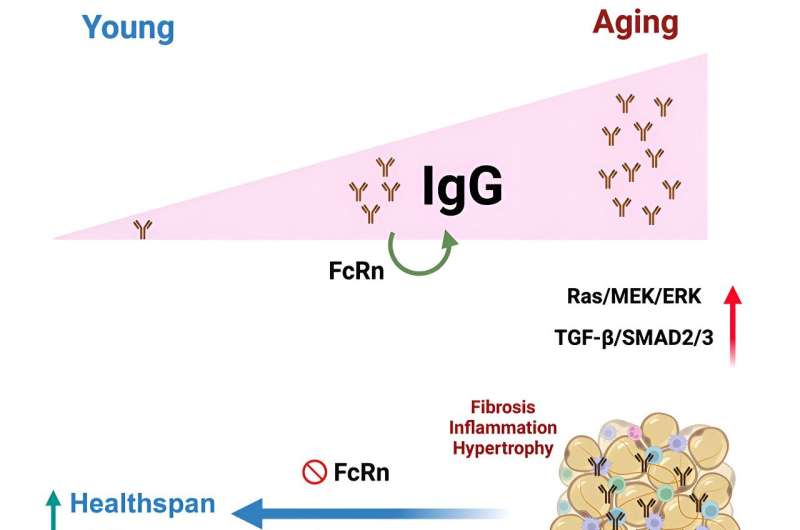This article has been reviewed according to Science X's editorial process and policies. Editors have highlighted the following attributes while ensuring the content's credibility:
fact-checked
peer-reviewed publication
trusted source
proofread
How does aging start? Scientists explain how IgG antibodies are a driving factor

Aging, a phenomenon that affects every individual, is a natural part of the human condition but one that often induces anxiety. These feelings are paired with health conditions and illnesses that accompany the aging process, all of which decrease lifespan, the amount of healthy and active years, and individuals' quality of life.
In an attempt to "mitigate" the adverse effects of aging, Professor Qiang Li's research team from the Peking University School of Basic Medical Sciences, in collaboration with Professor Wang Liheng's research team, published the results of their latest research on immunoglobulin G (IgG) as a driving factor in the early stages of aging in the journal Cell Metabolism.
Professor Qiang said himself that the significance of this study is twofold. Firstly, it reveals that excessive IgG antibodies are a driving factor in aging, and secondly, that IgG linked to aging begins to accumulate in the adipose tissue of humans at a very young age, even as early as young adulthood.
Therefore, not only did this research team identify a prominent variable in aging, but they also alerted the medical community to the comparatively early onset of this natural phenomenon within the human lifespan, allowing researchers and medical providers to monitor patients better and prolong the period of healthy lifespan with early intervention and preventative care.
As Professor Qiang succinctly put it, past research has mainly focused on the results or "fruits" of aging while his team has innovated by looking for the "causes."
A key feature of aging is pronounced metabolic decline, and preserving metabolic health is essential to maintaining a high quality of life and healthy body function for as long as possible.
Qiang, Wang, and their teams found that IgG is a driving factor in this facet of the aging process. Excess IgG in white adipose tissue can lead to conditions like fibrosis, inflammation, and insulin resistance, all of which speed up the human body's aging process and are associated with detrimental health conditions.
These research teams found, however, that caloric restriction can impede, slow, and even undo some of the process of IgG accumulation in adipose tissue, thus preserving the function of adipose tissue and maintaining overall metabolic health for longer.
This research was conducted through studies on both human and mouse adipose tissue, tracing the parallel increase of age and concentration of IgG in adipose tissue. This 2024 publication is founded upon formative research conducted by related teams published in 2020 and 2023, respectively.
While this study made a significant conceptual leap in understanding the relationship between aging drivers and IgG, these research teams will continue to establish the impact of IgG on the aging process and metabolic decline, dedicating future research to understanding the mechanisms behind this process and testing methods of intervention of IgG accumulation to delay aging if possible.
More information: Lexiang Yu et al, IgG is an aging factor that drives adipose tissue fibrosis and metabolic decline, Cell Metabolism (2024). DOI: 10.1016/j.cmet.2024.01.015





















